ESG & CSR For Construction & Real Estate Sector
Case Study: Horticulture Livelihood and Urban Greening Initiative with Earth5R and Larsen & Toubro
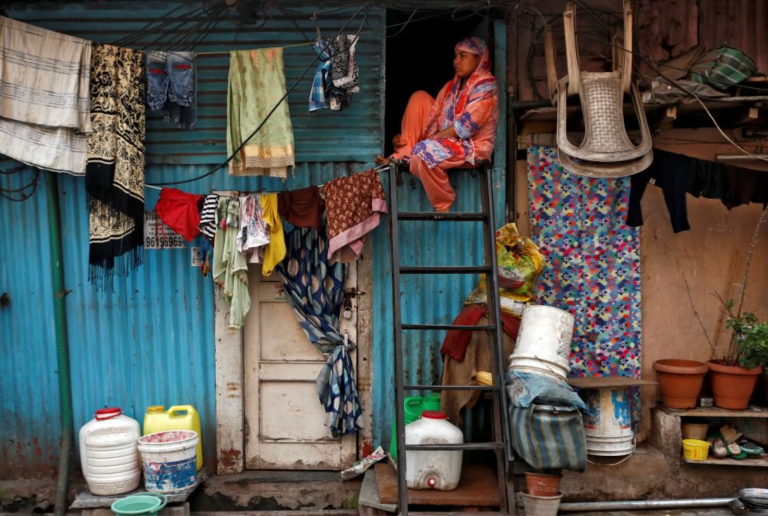
INTRODUCTION
In collaboration with Larsen & Toubro, Earth5R launched an innovative horticulture program in a large slum area in Mumbai. The initiative focused on training women living in the slums to grow saplings from seeds and small plants from saplings. The program addressed multiple urban challenges, including the urban heat island effect, air quality concerns, and lack of livelihood opportunities. By utilizing local resources like compost and upcycled containers, this initiative not only generated income for the women but also contributed to local plantation drives, reducing the carbon footprint and enhancing the city’s greenery.
THE PROBLEM STATEMENT
Urban areas like Mumbai suffer from a shortage of trees, which leads to poor air quality, heat retention, and a rise in temperatures, especially on rooftops made from tin, where the urban heat island effect is prominent. Additionally, women in slum areas often lack stable livelihood opportunities. Traditionally, saplings for plantation programs are transported from distant nurseries, adding to the carbon footprint. This program aimed to address these interconnected challenges by growing saplings locally while providing economic opportunities for slum women.
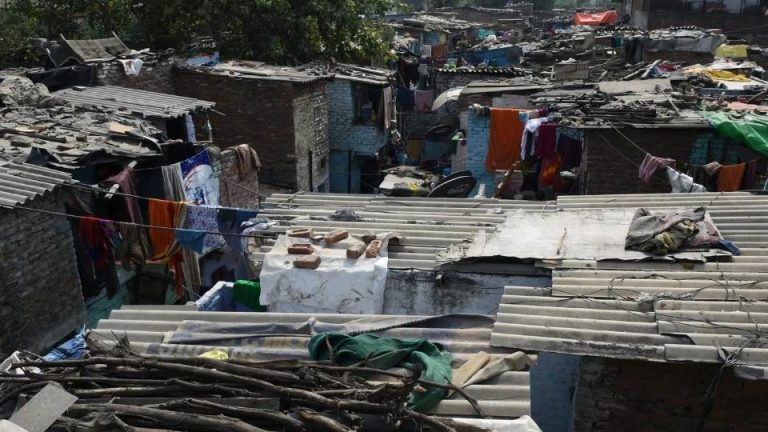
In India’s slums, metal rooftops trap heat, worsening living conditions as temperatures rise.
EARTH5R’S INTERVENTION & SOLUTION
Earth5R designed a holistic solution that combined environmental restoration, social empowerment, and economic upliftment:
- Training Program for Women: Earth5R volunteers trained 1,400 families in the slum area on how to grow saplings from seeds and small plants from saplings. These women were equipped with practical knowledge on composting, plant care, and container gardening, using their rooftops as mini-nurseries.
- Use of Local Compost and Upcycled Containers: The compost provided to the women was sourced from Earth5R’s composting programs, where residential buildings in the local area were trained to process food waste. Upcycled containers, gathered through recycling programs, were used as pots for the saplings, creating a closed-loop circular economy.
- Addressing the Urban Heat Island Effect: By growing plants on rooftops, the program helped reduce rooftop temperatures, particularly during the hot summer months. Watering the plants daily not only cooled the rooftops but also improved the indoor temperature of the houses, enhancing living conditions.
- Selling Saplings to Corporates: Once the saplings reached maturity in two to three months, they were sold to corporations conducting plantation programs. Previously, these plants were transported from outside the city, but by growing them locally, the program significantly reduced the carbon footprint related to transportation.
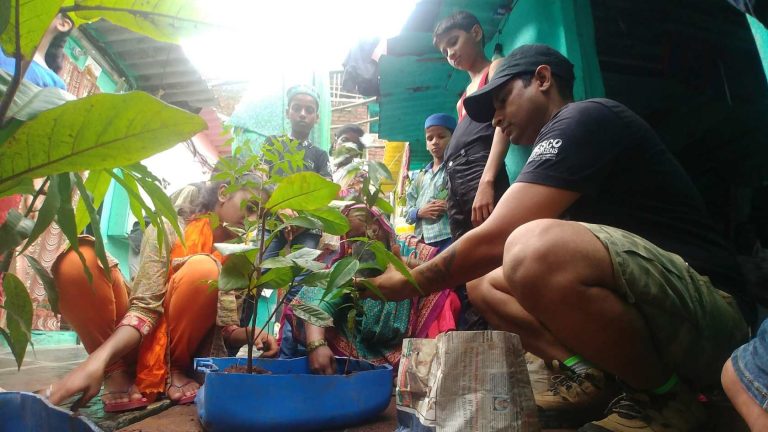
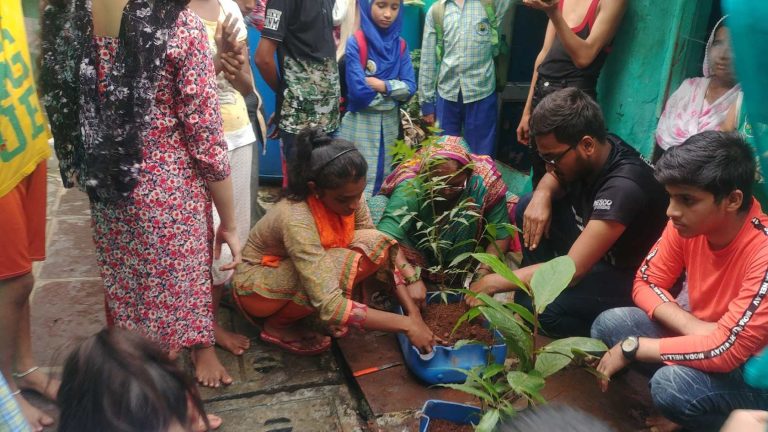
Plants are placed on rooftops to minimize heat and cool the space below.
OUTCOMES
- Saplings Grown and Sold:
- Each of the 1,400 families involved in the program grew 70 to 80 saplings per cycle, with each cycle lasting around three months. Over the course of one year (four cycles), the total number of saplings grown was approximately: 1,400 families x 75 saplings x 4 cycles = 420,000 saplings produced annually.
- Income Generated:
- Each woman was paid ₹100 per sapling. Therefore, the total income generated for these women over one year was: 420,000 saplings x ₹100 = ₹4.2 Crores (₹42,000,000), directly contributing to the economic upliftment of the slum community.
- Carbon Offset:
- On average, one tree can sequester 22 kg of CO2 per year. Assuming that half of the saplings survive to full maturity, the carbon offset for 210,000 trees would be: 210,000 saplings x 22 kg of CO2 = 4,620,000 kg (4,620 metric tonnes) of CO2 offset annually.
- Circular Economy Value:
- By integrating compost made from food waste and upcycled containers into the program, Earth5R not only reduced waste but also created a tangible circular economy impact. The use of local compost and recycled materials contributed to sustainability while creating a local economy around waste management.
- Environmental and Social Impact:
- Environmental Impact: The program increased green cover in the urban area, contributing to improved air quality, reduced temperatures, and better overall environmental conditions. Locally grown plants also reduced the transportation-related carbon footprint.
- Social Impact: Women in the slum area gained a new source of livelihood, improving their economic status and empowering them with skills in horticulture and sustainable practices.

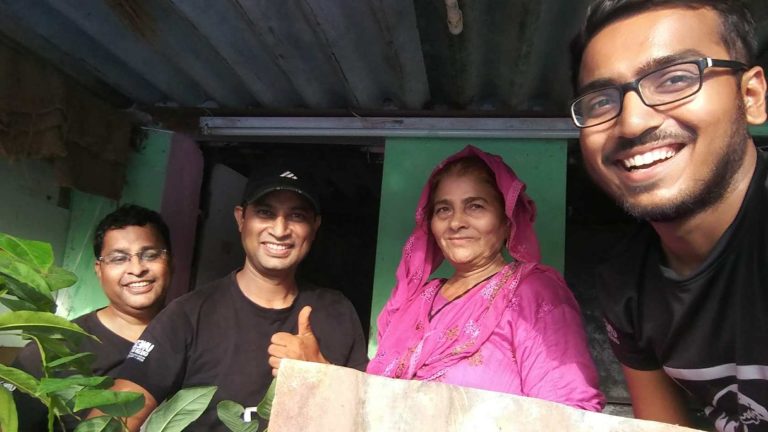
Slum residents are paid once the plants reach sufficient height and are ready for transplantation.
THE ROAD AHEAD
The success of this initiative has inspired Earth5R and Larsen & Toubro to expand the program to other urban areas in India. The long-term vision is to scale this model across more cities, addressing urban environmental challenges while providing livelihood opportunities to underprivileged communities.
ABOUT EARTH5R
Earth5R is an ESG and CSR “Action” platform that empowers communities to take real-world action on environmental challenges. Through its circular economy programs, Earth5R fosters sustainable solutions while driving social impact and economic growth. Earth5R’s work has contributed to offsetting over 954,000 tons of CO2, planting 87,000 trees, and engaging 1.3 million citizens globally. By leveraging technology through its award-winning app, Earth5R enables individuals, governments, and businesses to collaborate in building sustainable, resilient communities
